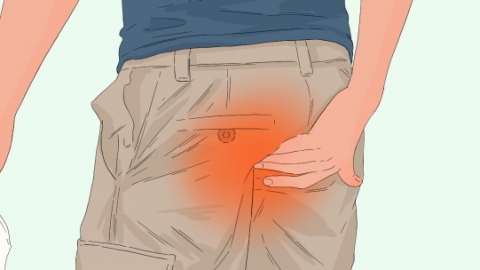What should I do if my hemorrhoids bleed every time I have a bowel movement?
Defecation usually refers to bowel movements. In general, bleeding from hemorrhoids immediately after defecation may be caused by factors such as stool friction against hemorrhoidal tissue, increased abdominal pressure during bowel movements, prolapsed internal hemorrhoids, incarcerated mixed hemorrhoids, or thrombosed external hemorrhoids. It is recommended to seek medical attention promptly, identify the underlying cause, and then improve symptoms under a doctor's guidance through lifestyle adjustments, medication, surgery, or other treatments. The specific causes are analyzed below:

1. Stool friction against hemorrhoidal tissue: Hard, dry, and coarse stools can directly rub against the mucosal surface of hemorrhoids during bowel movements, causing mucosal damage and bleeding. This often presents as blood on toilet paper or dripping blood. Daily management includes increasing fluid intake—drinking 1500–2000 mL of warm water per day—and consuming more dietary fiber-rich foods such as oats, celery, and apples to soften stools and reduce friction against hemorrhoids.
2. Increased abdominal pressure during defecation: Straining and holding one’s breath while defecating leads to a sudden rise in intra-abdominal pressure, which increases vascular pressure within hemorrhoids and may cause them to rupture and bleed. This is commonly seen in individuals with constipation or poor bowel habits. Regular physical activity, such as a 30-minute daily walk, can promote intestinal motility and help relieve constipation.
3. Prolapsed internal hemorrhoids: As internal hemorrhoids progress, they may protrude from the anus along with stool during bowel movements. The mucosa becomes irritated, rubbed, or stretched, leading to bleeding. After defecation, manual reduction may be required. Patients should follow medical advice to use medications such as compound algin suppositories, Ma Yinglong Musk Hemorrhoids Suppositories, or Guan Tai suppositories to reduce mucosal inflammation and stop bleeding.
4. Incarcerated mixed hemorrhoids: Mixed hemorrhoids involve both internal prolapse and external swelling. When the prolapsed tissue cannot be reduced, it becomes trapped (incarcerated), obstructing venous return. This results in congestion, swelling, and eventual rupture and bleeding of the hemorrhoid, often accompanied by severe pain. Immediate medical care is necessary. Initially, follow doctor’s instructions to use potassium permanganate solution for sitz baths to reduce swelling, followed by medications such as diosmin tablets, micronized purified flavonoid fraction (Daflon), or calcium dobesilate capsules to improve venous circulation.
5. Thrombosed external hemorrhoids: Rupture of veins in external hemorrhoidal plexuses leads to thrombus formation. During bowel movements, irritation at the site of the clot can cause surface breakdown and bleeding, resulting in intense pain and a palpable hard lump locally. If the thrombus is large and the pain is unbearable, surgical intervention such as excision of the thrombosed external hemorrhoid may be performed—making an incision to remove the clot and rapidly relieve symptoms.
In daily life, avoid spicy and irritating foods such as chili peppers and Sichuan pepper, quit smoking and drinking alcohol; maintain anal hygiene by washing with warm water after bowel movements, avoid prolonged sitting or standing, maintain regular作息 (sleep-wake cycles), and adopt comprehensive care measures to reduce the frequency of hemorrhoidal bleeding, promote recovery, and preserve anal health.




